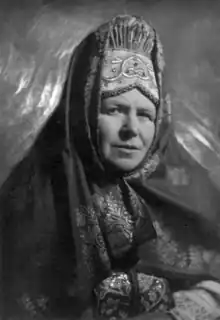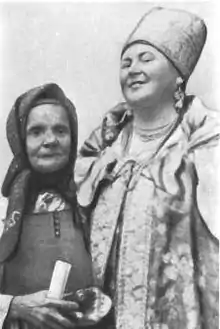Olga Ozarovskaya
Olga Erastovna Ozarovskaya (Russian: О́льга Эра́стовна Озаро́вская; 1874 – 1933) was a Russian folklorist, storyteller, performer, writer, and an archivist of fairy tales.[2] She published a few Northern Russian folklore collection books.[3] Additionally she was the first female civil servant, and the first women to do major scientific institution work within the Russian Empire.[4][5] She worked with Russian folklore performer Mariya Krivopolenova.
Olga Ozarovskaya | |
|---|---|
О́льга Эра́стовна Озаро́вская | |
 | |
| Born | Olga Erastovna von Ozarovskaya 13 June 1874 |
| Died | 2 June 1933 (aged 58) |
| Other names | Olga Erastovna Ozarovskaya |
| Occupation(s) | Folklorist, storyteller, performer, writer, archivist of fairy tales |
| Spouse | Vasily Dmitrievich Sapozhnikov (m. 1901–1910; death) |
| Children | 1, Vasilko Vasilyevich Ozarovsky[1] |

Early life and education
Olga Erastovna von Ozarovskaya was born in St. Petersburg, Russian Empire to parents Erast and Varvara Petrovna von Ozarovsky. Her father was in the Russian artillery.[5] She had two brothers, Alexander Erastovich Ozarovsky, and Yuri Erastovich Ozarovsky. Her brother Alexander was a military officer, and her brother Yuri became an actor and the director of the Alexandrinsky Theatre.
She graduated with a degree in chemistry from St. Petersburg University (now Saint Petersburg State University); followed by graduating in 1897 with a degree in mathematics from Higher Women's Courses in St. Petersburg.
Career and late life
From 1898 to 1900, she worked in a civil servant role as a lab technician at the Bureau of Weights and Measures, under chemist Dmitri Mendeleev.[4] At this time in history, women did not hold civil service jobs in the Russian Empire; for her to be hired, the then-finance minister Sergei Witte needed to have a decree signed by Nicholas II of Russia.[4] In 1901 she married Vasily Dmitrievich Sapozhnikov, someone she had met at the Bureau of Weights and Measures; and together they had one son, Vasilko Vasilyevich Ozarovsky.[4] Her husband died in 1910.
In the early 20th-century around 1907, Ozarovskaya began performing in amateur circles and for societies.[5] In 1911, she moved to Moscow and founded the Living Word Studio.[3] Between 1915 and 1925, she travelled to Northern Russia four times in order to document the traditional Northern Russian folktales, songs, and epic stories.[5] In 1915, Ozarovskaya had travelled to Arkhangelsk Governorate to collect songs, there she met Mariya Krivopolenova whom she took along with her to Moscow in order for her to perform.[6] She also transcribed Krivopolenova's work, which helped her work gain popularity.[5]
Ozarovskaya died on 12 June 1933 in Frunze (now Bishkek), Kirghiz ASSR, Soviet Union.[4] Her personal archive is stored in St. Petersburg, in the Pushkin State Museum of Fine Arts.[4]
Publications
- Ozarovskaya, Olga Erastovna; Krivopolenova, M.D (1916). Бабушкины старины [A Grandmothers Past] (in Russian). Издательство Огни.
- Ozarovskaya, Olga (1931). Пятиречие [Five Rivers] (in Russian).
- Ozarovskaya, Olga (2012). "The Luck of the Tsarevna". Russian Magic Tales from Pushkin to Platonov. ISBN 9780141392547.
{{cite book}}:|work=ignored (help)
See also
References
- Korsunsky, Mikhail (September 14, 2005). "Учитель любви к природе". Socio-political newspaper MCH, Bishkek (Общественно-политическая газета МСН) (in Russian). Archived from the original on March 5, 2016. Retrieved 2022-06-21.
- "Озаровская О. Э." [Ozarovskaya O. E.]. Энциклопедия циркового и эстрадного искусства (in Russian). Retrieved 2022-06-21.
- Bovshek, Anna (Summer 2009). "Анна Бовшек - ОЛЬГА ЭРАСТОВНА ОЗАРОВСКАЯ". Toronto Slavic Quarterly, University of Toronto. Retrieved 2022-06-21.
- Korsunsky, Mikhail (August 23, 2005). "Без памяти доброй…". Socio-political newspaper MCH, Bishkek (Общественно-политическая газета МСН) (in Russian). Archived from the original on 2016-03-05.
- Russian Magic Tales from Pushkin to Platonov. Penguin UK. 2012-12-06. p. 167. ISBN 978-0-14-139254-7.
- Rumyantsev, Vyacheslav. "Кривополенова Мария Дмитриевна". Chronos (in Russian). Archived from the original on 2012-03-08.